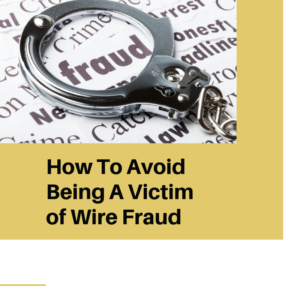 Wire fraud in real estate is one of the fastest growing cybercrimes in the country. The FBI reportedly received 301,580 complaints in 2017 and losses exceeded $1.4 billion, and in the real estate/rental sector alone, more than 9,600 victims lost over $56 million in the same year. LUVA Real Estate takes the security of our clients very seriously. We make it a point to provide fraud protection information throughout the transaction.
Wire fraud in real estate is one of the fastest growing cybercrimes in the country. The FBI reportedly received 301,580 complaints in 2017 and losses exceeded $1.4 billion, and in the real estate/rental sector alone, more than 9,600 victims lost over $56 million in the same year. LUVA Real Estate takes the security of our clients very seriously. We make it a point to provide fraud protection information throughout the transaction.
The entire team at LUVA understands the threat of wire fraud and works with our clients to inform them of the threat and the steps we and our trusted escrow companies take to keep our clients protected. The type of fraud with the highest reported loss last year was Business Email Compromise (BEC)/Email Account Compromise (EAC), with losses totaling more than $675 million.
In real estate transactions, fraudsters assume the identity of the title or real estate agent handling the sale. The criminals forge the person’s email and other details that appear specific and authentic. Next, posing as the real estate or title agent, the scammers send an email to the buyer, providing wire instructions to the criminal’s bank account, not the title agency’s legitimate account.
We recently spoke with Cody Day, Assistant Vice President, Fidelity National Title and Escrow of Hawaii. She shared that the fraudsters are getting more bold and clever.
She shared a few instances of how the fraud occurred:
- The fraudsters called the homebuyer, masquerading as the title company, asking them to wire the money, saying the transaction is on deadline so that the buyer won’t have time to contact their Realtor or the escrow company directly to double check. They do this on a Friday afternoon or right before a holiday.
- The fraudsters sent emails that LOOKED like they were from the title company and Realtor, but they had Gmail account addresses and it went unnoticed until the client was asked to send the funds to the title company and the buyer stated in shock, “I already did that last Friday.”
- The fraudsters contacted the buyer and offered them a $500 discount if they wired their funds early.
Here are tips that everyone should know to protect themselves during a real estate transaction:
One common scenario is altering wiring instructions with the intention of rerouting funds. DO NOT TRUST EMAILED INSTRUCTIONS. Fraudsters often use email to send falsified wire instructions to unsuspecting victims. Only follow wire instructions you receive personally from the designated title/escrow company.
Alternative Instructions? Be Wary.
If you receive alternative wiring instructions that appear to be from the title company, contact your escrow officer at a trusted phone number for confirmation. Know that the wiring instructions of title companies do not change, so any communication is suspect.
Call the Party Who Sent the Instructions
Always verify wire instructions, specifically the ABA routing number and account number, by calling the party who sent the instructions to you. DO NOT use the phone number provided in the email containing the instructions, use phone numbers you have called before or can otherwise verify.
Obtain the numbers of relevant parties to the transaction as soon as escrow is opened. Do NOT send an email to verify as the email address may be incorrect or the email may be intercepted by the fraudster.
Use complex email passwords that employ a combination of mixed case of letters, numbers and symbols. Make your passwords greater than 8 characters. Also change your password often and do not reuse that same password for other online accounts.
You can learn more directly from the Federal Bureau of Investigations and what the FBI is currently doing to take down the bad operators around the world who are being tracked down and stopped. https://www.fbi.gov/news/stories/international-bec-takedown-061118
LUVA Real Estate agents will discuss how the transaction will transpire and introduce you to your escrow coordinator. With good communication with you throughout the process, there is less stress and worry about wire fraud occurring during what should be a happy time in your life.